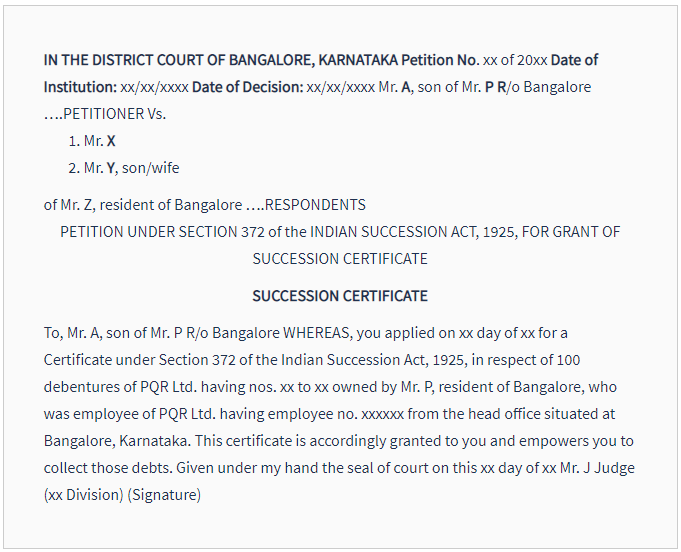A succession certificate is a certificate given to the successor of a deceased person who has not prepared a will. A succession certificate is given to the successor of a deceased person who has not prepared a will in order to establish the authenticity of the successor.
The succession certificate also gives the certificate holder authority over the deceased person’s debts and securities. The payment of debts of the deceased person and also the transfer of the securities of the deceased person can be made by the certificate holder.
Obtaining a Succession Certificate
A succession certificate is issued by the district judge of the relevant jurisdiction. To obtain a succession certificate, a petition should be prepared and filed in the relevant district court.
The relevant jurisdiction of the district court for filing a petition for obtaining a succession certificate would be where the deceased person ordinarily resided at the time of his death. If no such place is available, the relevant jurisdiction would be within which any property belonging to the deceased may be found.
Procedure to Obtain a Succession Certificate
The legal procedure to obtain the succession certificate is highlighted as below:
Step 1: Preparation of Petition
The applicant will prepare a petition, verify and sign the same and submit it to the district judge in the appropriate jurisdiction after paying the appropriate court fees.
Step 2: Submission to Court
The district judge will give an opportunity for the preliminary hearing of the petition filed by the applicant/petitioner and if the petition is admitted, he shall fix a day for the final hearing in respect of the same and also send notice of the hearing to whomsoever he thinks fit.
Step 3: Grant of Certificate
After hearing all the concerned parties, the judge will decide if the applicant is within his right to apply for the succession certificate and shall grant the succession certificate to him if satisfied.
Step 4: Submission of Bond
The district judge may also require the applicant to provide a bond with one or more sureties or any other security so as to make good any possible loss arising out of the use or misuse of such certificate.
Note: The district judge may also grant an extension in respect of any debt or security that was not included in the earlier application.
Particulars of the Petition for Succession Certificate
The petition for the succession certificate made to the district judge must be signed and verified by the applicant and include the following details:
- The time of the death of the deceased.
- The ordinary residence of the deceased at such time of death; and if such ordinary residence is not available, the details of the property that is within the jurisdiction of the district judge to whom such an application is made.
- The family or other near relatives of the person deceased and their respective residences.
- The rights of the petitioner (applicant).
- The absence of any reason to invalidate the grant of the certificate.
- The debts and securities in respect of which the application for such a certificate is made.
Validity of Succession Certificate
The succession certificate stands valid anywhere within India. However, where a certificate has been granted in a foreign country, by an Indian representative (as appointed by the government), accredited to that state, the certificate will stand valid only if properly stamped in accordance with the Court Fees Act, 1870 to have the same effect in India as a certificate granted in India.
Effect of the Succession Certificate
The main purpose of this certificate is to provide protection to all parties paying debts where such payments are made in good faith. The certificate holder is also empowered to receive any interest/dividend on the securities and negotiate or transfer such securities as mentioned in the certificate. Thus all payments made to and by the certificate holder on behalf of the deceased person will be legally valid.
However, this does not necessarily mean that the certificate holder is the owner of the securities or the legal heir. The legal heir/heirs are determined by a separate procedure of law.
Format of Succession Certificate
The following is an illustrative format of the succession certificate:

Differences between Succession Certificate and Legal Heir Certificate
The following are the main differences between Succession Certificate and Legal Heir Certificate:

